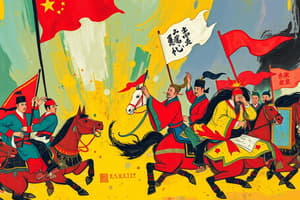Podcast
Questions and Answers
What was the primary reason Hong Xiuquan led the Taiping Rebellion?
What was the primary reason Hong Xiuquan led the Taiping Rebellion?
- Desire for Western-style governance
- Personal sickness and religious visions (correct)
- Influence from foreign powers
- Economic hardship among the peasantry
Which of the following was NOT an effect of the Taiping Rebellion?
Which of the following was NOT an effect of the Taiping Rebellion?
- Strengthening of the Chinese government (correct)
- Increased debate over government reform
- More attention to education
- Weakened central authority
Who established the Open Door Policy in China?
Who established the Open Door Policy in China?
- Sun Yixian
- The United States (correct)
- Japan
- European powers
What were the Three Principles of the People proposed by Sun Yixian?
What were the Three Principles of the People proposed by Sun Yixian?
What was one major outcome of the Boxer Rebellion?
What was one major outcome of the Boxer Rebellion?
Flashcards
Taiping Rebellion
Taiping Rebellion
A peasant rebellion led by Hong Xiuquan that aimed to establish a Heavenly Kingdom of Great Peace.
Empress Dowager Cixi's stance on reforms
Empress Dowager Cixi's stance on reforms
The Empress Dowager Cixi favored upholding traditional Chinese practices and resisted significant reforms, preferring to maintain control over the Qing dynasty.
Self-Strengthening Movement
Self-Strengthening Movement
A series of reforms implemented by the Qing government to modernize China's military and educational system.
Open Door Policy
Open Door Policy
Signup and view all the flashcards
Three Principles of the People
Three Principles of the People
Signup and view all the flashcards
Study Notes
The Taiping Rebellion
- Hong Xiuquan led the Taiping Rebellion.
- Hong Xiuquan experienced illness and visions.
- His visions led to the idea of the Heavenly Kingdom of Great Peace.
- He attracted the lower classes and women to his cause.
- The rebellion weakened the Chinese government and sparked debate about reform.
Empress Dowager Cixi
- Empress Cixi favored traditional styles.
- She resisted change.
Aftermath of the Taiping Rebellion
- China improved education systems.
- Western technology was adopted.
- China built warships.
Self-Strengthening Movement
- The movement faced financial challenges.
- Government support was inconsistent.
Sino-Japanese War
- Japan gained Taiwan resulting from the war.
Sphere of Influence
- European powers exploited China's economy.
Open Door Policy
- The U.S. established the Open Door Policy.
- The policy aimed to prevent colonization and protect U.S trading interests.
Hundred Days of Reform
- Emperor Guangxu launched reforms.
- Empress Cixi imprisoned Guangxu, fearing foreign intervention.
- The reforms failed to achieve their goals.
Boxer Rebellion
- After the Boxer Rebellion, China signed the Boxer Protocol.
- The rebellion strengthened nationalistic feelings in China.
Sun Yat-sen's Three Principles of the People
- Sun Yat-sen established a new form of government.
- The principles included: Nationalism, Democracy, and the pursuit of a livelihood for all.
Sun Yat-sen's Presidency
- Sun Yat-sen became president.
Studying That Suits You
Use AI to generate personalized quizzes and flashcards to suit your learning preferences.




